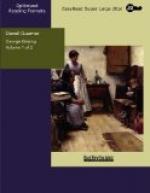One man there was who might have been expected to credit such charges, yet surprised his acquaintances by what seemed an unwonted exercise of charity. Mr. Scatchard Vialls, hitherto active in defamation of Quarrier, with amiable inconsistency refused to believe him guilty of conduct which had driven his wife to suicide. It was some days before the rumour reached his ears. Since the passage of arms with Serena, he had held aloof from Mrs. Mumbray’s drawing-room, and his personality did not invite the confidence of ordinary scandal-mongers. When at length his curate hinted to him what was being said, he had so clearly formulated his own theory of Mrs. Quarrier’s death that only the strongest evidence would have led him to reconsider it. Obstinacy and intellectual conceit forbade him to indulge his disposition to paint an enemy’s character in the darkest colours.
“No, Mr. Blenkinsop,” he replied to the submissive curate, standing on his hearth-rug at full height and regarding the cornice as his habit was when he began to monologize—“no, I find it impossible to entertain such an accusation. I have little reason to think well of Mr. Quarrier; he is intemperate, in many senses of the word, and intemperance, it is true, connects closely with the most odious crimes. But in this case censure has been too quick to interpret suspicious circumstances—suspicious, I admit. Far be it from me to speak in defence of such a person as Mrs. Wade; I think she is a source of incalculable harm to all who are on friendly terms with her—especially young and impressionable women; but you must trust my judgment in this instance: I am convinced she is not guilty. Her agitation in the coroner’s court has no special significance. No; the solution of the mystery is not so simple; it involves wider issues—calls for a more profound interpretation of character and motives. Mrs. Quarrier—pray attend to this, Mr. Blenkinsop— represents a type of woman becoming, I have reason to think, only too common in our time, women who cultivate the intellect at the expense of the moral nature, who abandon religion and think they have found a substitute for it in the so-called humanitarianism of the day. Strong-minded women, you will hear them called; in truth, they are the weakest of their sex. Let their energies be submitted to any unusual strain, let their nerves (they are always morbid) be overwrought, and they snap!” He illustrated the catastrophe with his hands. “Unaided by religion, the




